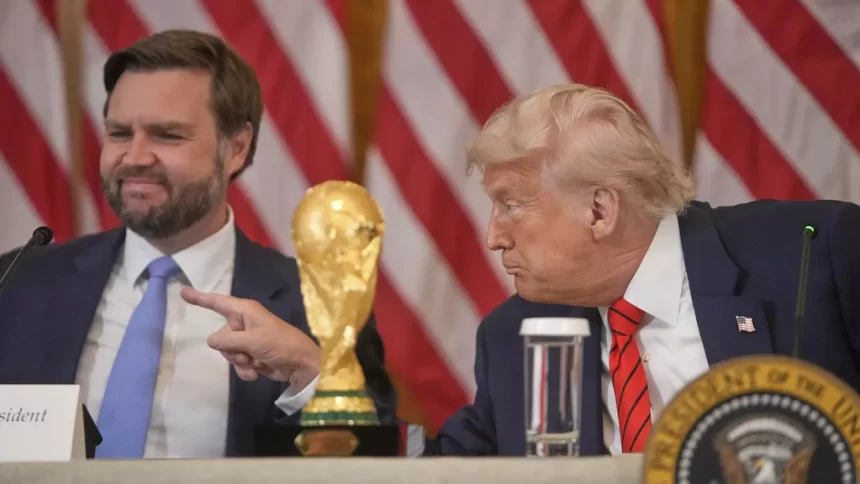As the United States prepares to host two of the world’s most high-profile sporting events—the 2026 FIFA World Cup and the 2028 Summer Olympics in Los Angeles—President Donald Trump’s newly expanded travel ban is casting a long shadow over international participation and fan attendance.
While Trump has repeatedly expressed enthusiasm about the World Cup and Olympics being centerpieces of his second term, the administration’s tightening of visa restrictions has stirred global concern over whether the U.S. is prepared to be an open and accessible host to the international community.
A New Ban With Global Implications
On Monday, a sweeping new U.S. policy went into effect, barring entry to citizens from 12 countries: Afghanistan, Myanmar, Chad, the Republic of Congo, Equatorial Guinea, Eritrea, Haiti, Iran, Libya, Somalia, Sudan, and Yemen. In addition, visitors from seven more nations—including Cuba, Venezuela, and Sierra Leone—will now face stricter entry protocols.
According to the Trump administration, these countries were flagged for having “deficient” security screening procedures or for refusing to repatriate their own nationals. But critics argue the policy could directly hinder the global nature of the World Cup and Olympics—events that thrive on open borders and international unity.
Athletes Safe, But Fans Face Roadblocks
Fortunately for competitors, the administration has carved out specific exceptions for athletes, coaches, and essential staff. These individuals will still be eligible to receive expedited visas for “major international sporting events,” including both the World Cup and the Olympics, according to U.S. State Department directives.
This ensures that teams from countries like Iran—which has already qualified for the 2026 tournament—will not be barred from competing. Others, including Cuba, Haiti, and Sudan, remain in contention and would be eligible under the same provisions should they qualify.
However, the same cannot be said for fans.
The travel ban includes no exemptions for sports enthusiasts or tourists hoping to attend the games, raising the prospect that entire national fanbases may be shut out. Even before this policy expansion, visa issues had plagued fans from countries like Iran, many of whom struggled to enter the U.S. for past international matches.
This lack of clarity is already triggering concerns among travel agencies, diaspora communities, and global sports governing bodies that fear a politically charged visa system could mar the inclusive spirit of both tournaments.
Who Gets Left Out?
For the Olympics, more than 200 countries typically send athletes. While the travel ban should not stop their participation, it may dampen overall international presence in host cities, particularly among fans from the 19 countries now facing restrictions.
The economic impact is not trivial. World Cup and Olympic tourists are typically high-spending visitors, making them highly desirable in terms of hospitality, transportation, and merchandise revenue. Their absence could impact local economies, particularly in host cities relying on peak tourist inflows.
Moreover, for many of the affected nations, potential attendees often come from the diaspora or wealthier segments of society—many of whom hold alternative passports. Still, the message being sent, critics warn, is one of exclusion.
Global Sporting Bodies on Alert
FIFA and the International Olympic Committee (IOC) are quietly monitoring developments. While neither organization has officially condemned the new U.S. policy, both have a clear interest in ensuring that their events proceed with minimal geopolitical disruption.
FIFA President Gianni Infantino has built strong ties with President Trump since 2018 and was seated prominently next to him during a White House task force meeting in May. That gathering also included Homeland Security Secretary Kristi Noem and other top officials involved in event planning for 2026.
The task force’s goal? Ensuring the U.S. executes a smooth tournament while balancing security needs and international cooperation.
For the LA28 Olympics, organizers say they’re reassured by federal commitments to streamline athlete visa processing. “It’s very clear the federal government understands that [Olympic hosting] requires special consideration,” said LA28 President Casey Wasserman. “We have great confidence that this will continue.”
Wasserman added that the State Department has already established a “fully staffed desk” dedicated to fast-tracking visa applications for participating teams. Yet again, this provision notably excludes fans.
IOC officials echoed the sentiment. Nicole Hoevertsz, chair of the IOC’s LA28 Coordination Commission, said she has “every confidence” the U.S. will manage visas for athletes responsibly, as it did during previous Games.
No Comment From FIFA, But Eyes Are Watching
While FIFA did not immediately comment on the new travel restrictions, internal concerns are mounting. With the expanded Club World Cup set to kick off next week in Miami, any bureaucratic delays or diplomatic flare-ups could signal deeper complications ahead of the 2026 World Cup.
FIFA’s revenue expectations for the 2023–26 cycle hover around $13 billion, with the lion’s share tied to the North American-hosted tournament. Ensuring seamless international participation—and full stadiums—is critical to meeting that target.
Precedents From Past Hosts
Other host nations have found creative solutions. Russia, in 2018, and Qatar, in 2022, allowed ticket holders to bypass traditional visa requirements, essentially letting a match ticket serve as a temporary entry permit—albeit with full background checks.
In contrast, past Olympic hosts have sometimes drawn hard lines. The U.K. barred Belarusian President Alexander Lukashenko from attending the London 2012 Olympics, citing security concerns. The IOC also suspended him from participating in the Tokyo 2021 Games.
A Tightrope Between Security and Global Unity
Balancing national security with international hospitality is always a challenge, especially in an era of geopolitical instability. But critics argue that a broad-strokes ban—especially one implemented so close to high-profile global events—sends the wrong message about America’s readiness to embrace the world.
As the countdown begins for the World Cup in 2026 and the Olympics in 2028, the U.S. finds itself at a crossroads: Will it be the beacon of international camaraderie these events promise, or will restrictive policies dampen the global celebration?


